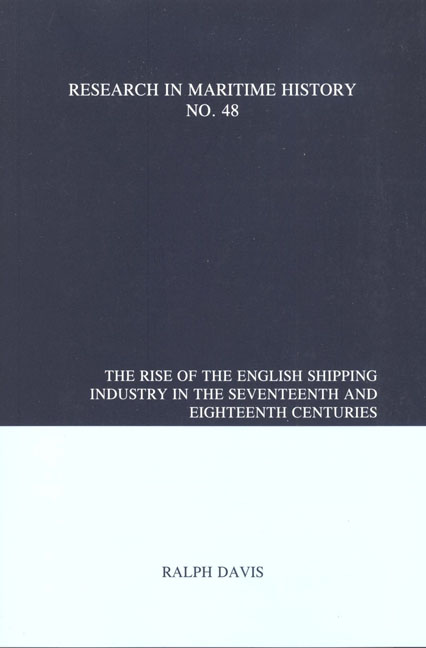Book contents
- Frontmatter
- Contents
- Introduction to the 2012 Edition
- Series Editor's Note
- Introduction
- Preface
- Chapter 1 The Widening of Horizons, 1560-1689
- Chapter 2 Consolidation, 1689-1775
- Chapter 3 Ships and Shipbuilders in the Seventeenth Century
- Chapter 4 Ships and Shipbuilders in the Eighteenth Century
- Chapter 5 The Shipowners
- Chapter 6 The Merchant Seamen
- Chapter 7 The Pay and Conditions of Merchant Seamen
- Chapter 8 Shipping Management and the Role of the Master
- Chapter 9 Shipping and Trade
- Chapter 10 The Nearby and Northern European Trades
- Chapter 11 The Southern European and Mediterranean Trades
- Chapter 12 The East Indian Trade
- Chapter 13 The American and West Indian Trades
- Chapter 14 The Government and the Shipping Industry
- Chapter 15 War and the Shipping Industry
- Chapter 16 Four Ships and Their Fortunes
- Chapter 17 Was It a Profitable Business?
- Chapter 18 Conclusion
- Appendix A A Note on the Shipping Statistics, 1686-1788
- Appendix B Sources for the History of the Shipping Industry
- Index
Chapter 7 - The Pay and Conditions of Merchant Seamen
- Frontmatter
- Contents
- Introduction to the 2012 Edition
- Series Editor's Note
- Introduction
- Preface
- Chapter 1 The Widening of Horizons, 1560-1689
- Chapter 2 Consolidation, 1689-1775
- Chapter 3 Ships and Shipbuilders in the Seventeenth Century
- Chapter 4 Ships and Shipbuilders in the Eighteenth Century
- Chapter 5 The Shipowners
- Chapter 6 The Merchant Seamen
- Chapter 7 The Pay and Conditions of Merchant Seamen
- Chapter 8 Shipping Management and the Role of the Master
- Chapter 9 Shipping and Trade
- Chapter 10 The Nearby and Northern European Trades
- Chapter 11 The Southern European and Mediterranean Trades
- Chapter 12 The East Indian Trade
- Chapter 13 The American and West Indian Trades
- Chapter 14 The Government and the Shipping Industry
- Chapter 15 War and the Shipping Industry
- Chapter 16 Four Ships and Their Fortunes
- Chapter 17 Was It a Profitable Business?
- Chapter 18 Conclusion
- Appendix A A Note on the Shipping Statistics, 1686-1788
- Appendix B Sources for the History of the Shipping Industry
- Index
Summary
There were three systems of calculating seamen's wages. The least important was by shares of the ship's earnings, the normal means of remunerating crews of fishing vessels and, in part, those of privateers, for fairly obvious reasons. It was occasionally used as well in small craft plying along the Channel coast, as in Ann, in 1685, whose owners were to have nine-twenty-sevenths of the proceeds of each voyage, the master six-twenty-sevenths and the crew fourtwenty- sevenths each, i.e., one-third to the owners and two-thirds to the crew. Half a century later a ship's master declared that in coasters on the south coast “The Master hath two thirds of the clear earnings of such vessels for victualling, manning and wages and the Owners have one third of such earning.” Possibly fishing was interspersed with the ordinary trading voyages of such craft, or at any rate their crews were recruited from men who were often engaged in inshore fishery and used to the share system; it may have been felt, too, that because the master of such a small vessel was close to his crew, had less authority over them, and was himself a less responsible person than the master of a larger ship it was necessary to give every man an incentive to operate the ship efficiently.
The other two systems were of roughly equal importance. Payment of a lump sum for the voyage was usual in all the other short voyages in which English ships engaged; in coastal, cross-Channel and Irish Sea trades and in those round the borders of the North Sea, to Flanders, Holland, Hamburg and Norway and, in the seventeenth century, to the French Biscay ports. There is a sharp division between these and the trades in which monthly wages were paid - those involving the longer voyages to the Baltic, North Russia, Spain, Portugal, the Mediterranean, and beyond Europe to America, Africa and the East. Firmly established custom determined the kind of wage payment, and masters and crews took it for granted that the custom would be followed when signing on for any voyage.
- Type
- Chapter
- Information
- The Rise of the English Shipping Industry in the Seventeenth and Eighteenth Centuries , pp. 127 - 152Publisher: Liverpool University PressPrint publication year: 2012



